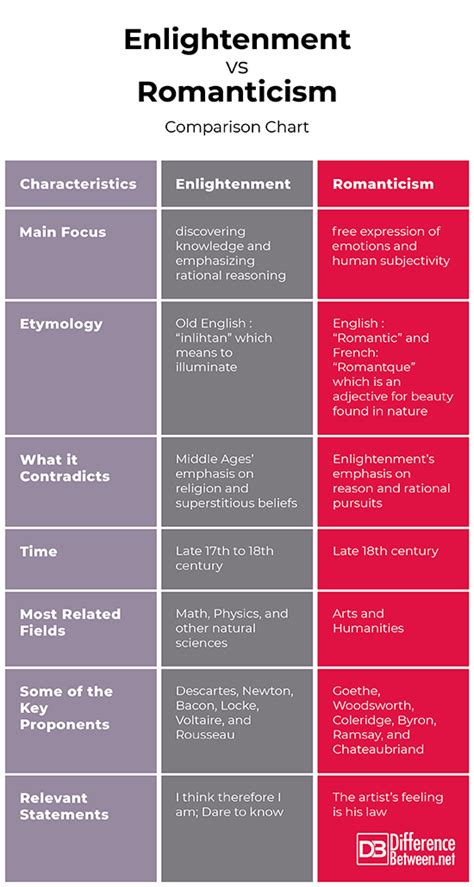Romanticism and Enlightenment, two distinct intellectual movements that shaped Western thought and culture, emerged during the 18th and 19th centuries, leaving a lasting impact on society. These movements differed significantly in their core principles, values, and artistic expressions.

Core Principles
-
Reason vs. Emotion: Enlightenment thinkers relied heavily on reason, logic, and scientific inquiry to understand the world, advocating for objectivity and rational thinking. Romantics, on the other hand, emphasized the importance of emotion, intuition, and imagination, believing that these qualities connected humans to a deeper, more profound reality.
-
Humanity vs. Divinity: Enlightenment philosophers viewed humans as rational beings capable of progress and enlightenment through education and scientific advancement. Romantics, however, saw humanity as flawed and in need of divine guidance and inspiration.
-
Nature vs. Civilization: Enlightenment intellectuals perceived nature as a source of order and rationality, while Romantics saw it as a realm of mystery, wonder, and the sublime. They believed that nature could inspire creativity and evoke profound emotions.
Values
-
Individualism vs. Collectivism: Enlightenment philosophers stressed individual rights and rationality, valuing intellectual inquiry and personal freedom. Romantics, in contrast, emphasized the importance of community, emotion, and belonging.
-
Progress vs. Tradition: Enlightenment thinkers believed in the inevitability of human progress through scientific discoveries and technological advancements. Romantics, on the other hand, valued tradition, history, and the wisdom of the past.
-
Objectivity vs. Subjectivity: Enlightenment thinkers sought to establish objective truths through scientific experimentation and observation. Romantics, however, recognized the subjective nature of experience and the role of imagination in shaping human perception.
Artistic Expressions
-
Literature: Enlightenment literature emphasized reason, clarity, and form. Romantics, however, explored themes of emotion, imagination, and the supernatural.
-
Music: Enlightenment music followed strict rules of harmony and counterpoint. Romantic music, on the other hand, embraced emotional intensity, expressive melodies, and programmatic elements.
-
Art: Enlightenment art often depicted scenes of rationalism, classicism, and mythology. Romantic art focused on emotional expression, passion, and the exploration of inner landscapes.
Impact on Society
-
Political thought: Enlightenment ideas influenced the development of modern democracy and the emphasis on individual rights. Romanticism contributed to the rise of nationalism and the glorification of the nation-state.
-
Education: Enlightenment thinkers promoted scientific and practical education, while Romantics advocated for the humanities, creativity, and emotional development.
-
Cultural values: Enlightenment rationality influenced the development of science and technology. Romanticism emphasized the importance of art, literature, and music in enriching human lives.
Tables
| Feature | Enlightenment | Romanticism |
|---|---|---|
| Core principle | Reason and logic | Emotion and intuition |
| View of humanity | Rational beings | Flawed and in need of guidance |
| Nature | Orderly and rational | Mysterious and sublime |
| Value | Individualism and progress | Gemeinschaft and tradition |
| Artistic expression | Clarity, form, reason | Emotion, imagination, subjectivity |
| Period | Enlightenment | Romanticism |
|---|---|---|
| Duration | 18th century | 19th century |
| Key figures | Immanuel Kant, Voltaire, John Locke | William Wordsworth, Percy Bysshe Shelley, Mary Shelley |
| Enlightenment literature | Characteristics | Romantic literature | Characteristics |
|---|---|---|---|
| Prose | Clarity, logic, objective | Poetry | Emotion, imagination, subjective |
| Drama | Rational conflict | Drama | Emotional intensity, supernatural elements |
| Novels | Bildungsroman, social satire | Gothic novels, historical romances |
| Enlightenment in politics | Characteristics | Romanticism in politics | Characteristics |
|---|---|---|---|
| Emphasis | Individual rights, rational government | Emphasis | Nationalism, glorification of the state |
| Key thinkers | John Locke, Montesquieu | Johann Gottfried Herder, Johann Gottlieb Fichte |
Tips and Tricks
- To understand Romanticism, delve into the works of William Wordsworth, Samuel Taylor Coleridge, and John Keats.
- To appreciate Enlightenment thought, read the writings of Immanuel Kant, Voltaire, and John Locke.
- When writing about Romanticism, emphasize the importance of emotion, imagination, and the subjective experience.
- When discussing the Enlightenment, focus on reason, logic, and scientific inquiry.
- Recognize the influence of both movements on modern Western thought, culture, and politics.
Common Mistakes to Avoid
- Do not oversimplify the differences between Romanticism and Enlightenment.
- Do not conflate Romanticism with sentimentalism or irrationality.
- Do not reduce Enlightenment thought to mere scientism or materialism.
- Be aware that the transition from Enlightenment to Romanticism was gradual and complex.
- Avoid making generalizations about the movements without considering the diverse views within them.
